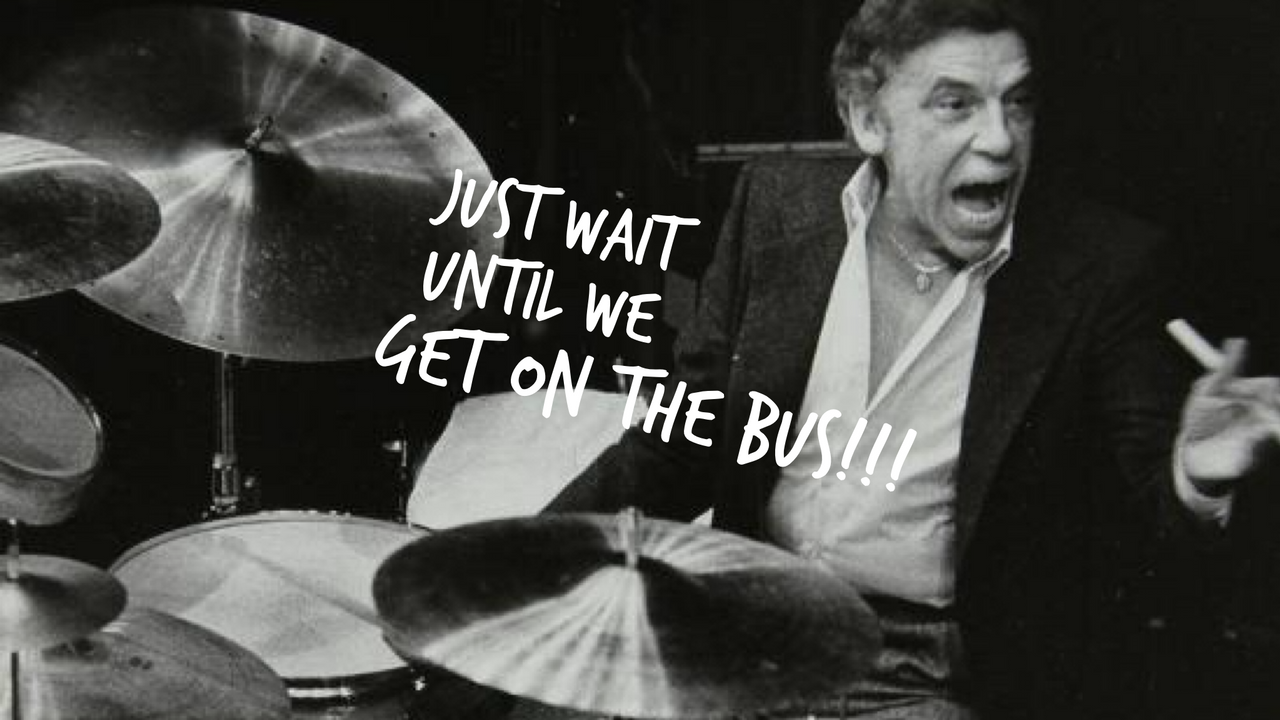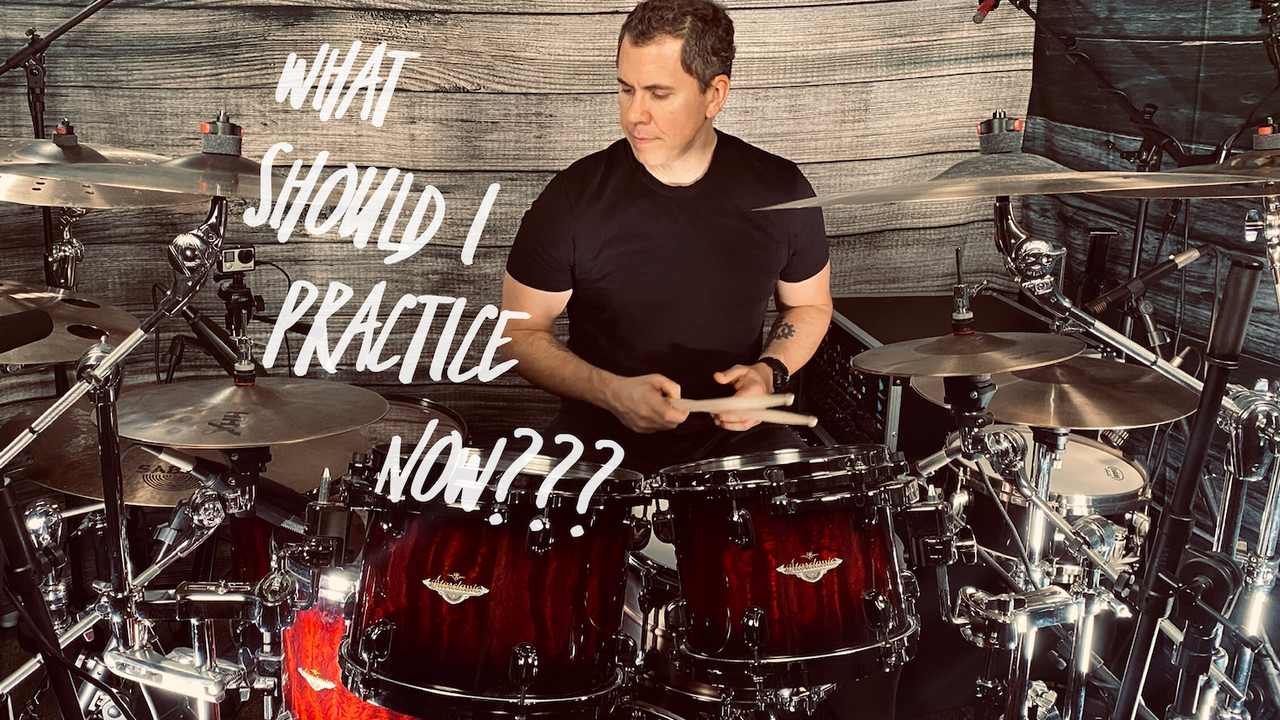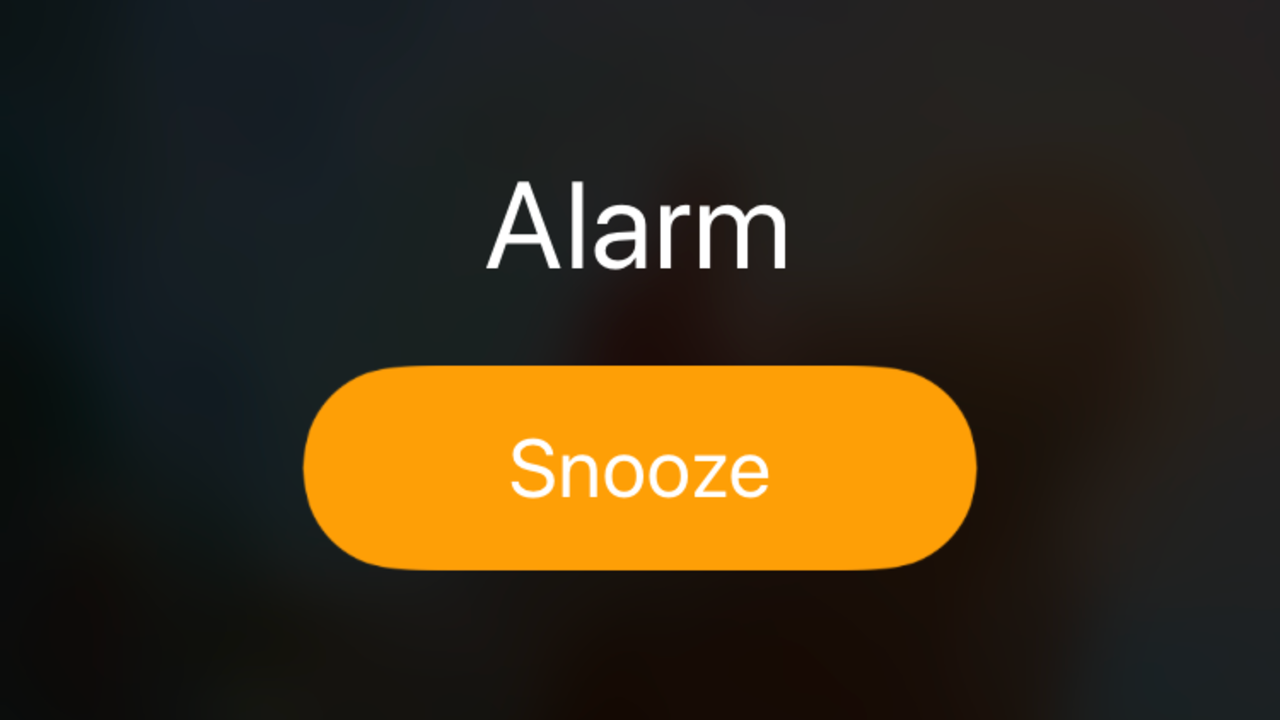The DRUM DISCIPLINE DOSSIER
Is your Practice Room Helping you Become Your BEST?
Probably for most of us, as long as we have access to a set of drums... we don’t care where they are! A basement, garage, shed, chicken coop, wherever —as long as we can play, we’re happy.
I don’t think there is anything wrong with that; the drums themselves should be the priority when we’re practicing. However, I do believe the environment that we practice in can actually help us make the most of our time.
Why is it sometimes when we practice we can get into the “zone” and really make some significant progress and other times we struggle with working on one idea for 30 seconds?
Yep, you guessed it—FOCUS.
We all struggle with it. Especially in today’s hyper-connective-information-saturated culture, it’s amazing we get anything done at all! Which is why we need to be on the offensive and not the defensive.
Being on the offensive means doing things that prevent the temptation from happening at all; don’t just try to not look at your phone (defensive)—put your phone in another room (...
Why You Should Be Grateful If You Have NO Natural Talent.

I don’t know anybody who has watched an amazing athlete, musician and/or performer and didn't think “I wish I had their natural ability that enables them to do that.” Probably the most common temptation is the desire for what someone else has–Maybe, that’s why God added it the 10 Commandments! However, I believe that skill, developed through hard work and discipline, is actually more valuable and rewarding than natural-born talent.
Let’s define some terms before we continue:
Talent is something you’re born with. An ability to naturally understand something which others who are talent-less have to develop.
Skill is a product of focused time and energy. Skill does not require any predisposed natural ability.
Of course there’s a spectrum that each of us fall into with varying levels of Talent and Skill. But, for the sake of clarity with the following perspective, we are going to maintain each one as mutually exclusive.
When I first moved to Nashville I came to the full realizat...
The #1 Strategy to Help YOU Become The BEST Drummer YOU Can BE!

All decisions have consequences. The decisions we make have a profound impact on what we become as drummers. With the deluge of easily accessible drumming information/education available to us, it is becoming increasing difficult to stay focused and make any true progress–let alone enable us to become the best drummers we can be.
Whether, it’s a cool “lick of the week”, a vintage Tommy Aldridge or new Benny Greb solo, a release of a new method book or just cool concept that neighbor Rasmus from down the street showed you – you have to make a decision.
You have to ask yourself “how valuable is this new information for me to reach my personal drumming goals?” Not goals that you feel others expect of you, but what is truly fulfilling and inspiring for you to be able to play and sound like.
I know you may say “but, Jeff I want to be great at everything”. I completely understand. But the reality is no drummer is great at everything. One can be really good at everything – but great? No...
You'll Never Be Ready, So DO IT ANYWAY!

Have you ever wanted to do something, but felt you just needed a little bit more time to really pursue it? I have–multiple times. However, there is a simple solution to help you overcome this. Read on...
I attended a very small private Christian school from Kindergarten to High School and the music program was next to nothing. I think our High School band had 9 musicians and 3 of them were drummers! So needless to say, I never had the opportunity to experience marching band/corps. Sometimes I would feel that I missed out on the benefits from this environment.
In 2003, I moved back to LA from Nashville and met up with Virgil Donati to catch up. He mentioned he had been taking lesson with this multiple winning rudimental world champion, Rob Carson—and has been really enjoying and benefitting from it. I figured this would be a good opportunity for me to “make up” for my missed drum corp/rudimental experiences growing up. I gave Rob a call.
For the next 18 months I studied off and on ...
Are you Practicing with Purpose?
I’m going on record by saying if you’re not practicing with purpose you’re really not practicing at all. I’m saying this because I need to hear it just as much as anyone.
I hate to admit it, but I have often gone to my practice room, not knowing exactly what I was going to do, worked on a page or two out of the “latest and greatest” drum book, played through a couple songs, experimented with a “new” snare tuning, checked my email a half-a-dozen times and then left feeling like I could’ve gotten more out of just watching “Sting: Live In Paris" w/ Josh Freese.
This type of "practice" is also called – a waste of time! It is time wasted because I didn’t have a purpose for which I was practicing. Purpose creates direction. Direction is fundamental because it provides the quickest way to the destination. Essentially, no direction means no destination.
To discover your destination the question(s) you have to ask is: Where do I want to go or What do I want to achieve with my drumming – u...
[LESSON] Is there HOPE for our weaker limbs?
Somedays, I feel like my left hand or left foot is actually getting worse. I have to remind myself that it's not-it's just my high expectations that make me feel that way.
When those times of frustration become too much and I need to feel at least a little progress, I make one switch in my practice-and the results are usually quite rewarding.
What's the "switch"?
Pretty simple, actually. I direct my focus to the weaker limb by giving it responsibility.
How do you give a limb responsibility?
Once again, simple. You make it the "leading" limb.
For an example, when we play a single stroke roll (with hands or feet) our stronger limb will lead and our weaker limb will follow-this is natural. The problem with this is the weaker limb will never receive enough focus and attention to make real improvement.
When we transfer the responsibility of "leading" to our weaker limb our attention and awareness of it increases dramatically and as a result the development accelerates.
Thi...
Are you playing the “Long Game” or the “Short Game”?
I don’t remember when I first heard this phrase but, I feel it’s always been in the back of my mind.
I comes down to having a vision for who you want to be. I think most of us have that vision. I think it’s one of the main things that separate us from animals. I doubt a turtle wakes up in the morning and thinks “how can I be a better turtle today than I was yesterday?”.
Having this vision is important…really important. Because that’s the goal we are aiming to achieve. That’s the Long Game.
Working towards achieving the Long Game won't produce immediate results. They gradually happen over time. Often a loooong time.
If your priorities are based on instant gratification (which usually don’t produce sustainable results), you’’re playing the Short Game.
The Long Game is, staying focused on your true priorities, being a good steward of your time, not letting immediate gratification distract you and just getting the work done. Just do the work.
You already know what to do. You don’t ...
[LESSON] Do you make this Common Mistake when playing this Popular Fill???
One of my biggest frustrations is listening back to a recording (live or studio) and hearing myself play something that I've been playing for years....but it sounds sloppy. Arrrrgh!!
How could something so seemingly easy and familiar compromise my entire performance?
Well, it comes down to one thing: Mindset.
If I don't make a conscience effort to play every note with conviction and confidence, I don't deserve to sound the way I desire. And that's what I want you to avoid! My goal is for you to sound the way you desire-without compromise!
Todays lesson is on the classic, Bucket o' Fish Fill. This is a timeless fill that has been used for decades and will continue.
However, as popular as it is, it's very easy to play sloppy! If we're not careful we too can get in that compromising mindset and think we're just crushing it...when we're not.
This lesson covers the common pitfalls us drummers face when trying to execute this fill. By focusing on just a couple techniques, you wil...
Don’t let the World decide how Good of a Drummer you Will be.

“If you don’t discipline yourself the world will do it for you”. - William Feather
Have you ever felt that the world may be against you, especially when you’re trying to accomplish something great? Well, it is. As amazing as this world is and the blessing it is to experience it everyday, it will throw many challenges our way-holding us back from reaching our full potential.
Our best strategy in overcoming these challenges is to be familiar with the different forms they may come in. Knowing what to prepare for will not only give us the edge we need to not succumb to these common trappings, but will also help us to learn and grow when and if we do. Almost all of these traps will fall into one of these three categories.
The three “D’s” to prepare for:
1) Distractions. This is one is pretty obvious. Anything that doesn’t directly or indirectly support our mission is a distraction. Television, video games, Netflix, YouTube and social media. Sure, we can say that some of these may help...
[LESSON] One Effective Way to Make the Most of Your Practice Time (World Champion Motion Exercise)
Nothing feels quite as good as when you finish your practice session and you know it couldn’t have been more productive. I aim for those moments. I don’t always get them, but I try to learn at least why I didn’t meet that expectation.
Usually it’s because I’ll let distractions get in my way. Sometimes my mind is not in the game and I’m focusing on something else. However, most of the time, it’s because I have spent too much energy on something that did not give equal returns.
Knowing what to practice and how to approach it will be the single most effective discipline you can develop. Being clear and strategic on what you focus on will be the main factor in how productive your practice sessions will be.
This lesson is on Motion/Mobility. We practice grooves a lot and rightly so. Most of our job is establishing a solid groove for the music. However, when there is a need/opportunity for a fill that requires the toms, our body will be using different muscles. If these muscles are not...

